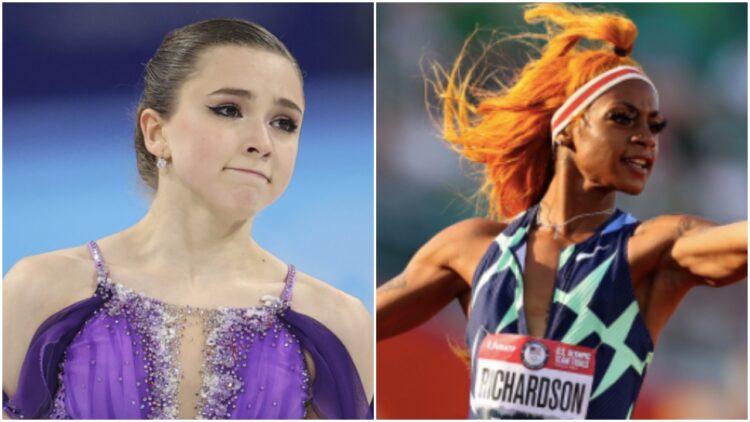Fifteen-year-old Russian figure skater Kamila Valieva was allowed to compete in the Winter Olympics in Beijing, China, after a performance-enhancing drug was found in her system and revealed on Feb. 7.
Sha’Carri Richardson, who was not allowed to compete in the Summer Olympics in Tokyo, Japan, for using the non-performance enhancing drug marijuana, wants to know the difference.
Valieva tested positive for the drug trimetazidine, a metabolic agent generally used for angina prevention and increases blood flow efficiency and improves endurance, assisting athletic performance.
Richardson, grieving her mother’s death, self-medicated with weed and was not allowed to compete in the Games despite being favored to win a medal. Vaieva, who was also favored to win a medal, was allowed to compete, and Richardson called out the International Olympic Committee on Twitter.
“Can we get a solid answer on the difference of her situation and mine? My mother died and I can’t run and was also favored to place top 3. The only difference I see is I’m a Black young lady,” wrote Richardson.”
https://twitter.com/itskerrii/status/1493209274457153536?s=20&t=jQpVMw7-gonT1Cym-6BykQ
Sha’Charri Richardson wasn’t the only one who called out the double standard on social media. Several Twitter users spoke on the alleged discrimination.
Neal Rogers noted that the drug Valieva used was clearly used to enhance her performance during competition, while Richardson did not.
“Sha’Carri Richardson was prohibited from competing at Olympics due to out-of-competition positive of drug unrelated to sport performance,” he wrote. “Kamila Valieva is being allowed to compete at Olympics although she had in-competition positive of drug clearly related to sport performance.
https://twitter.com/nealrogers/status/1493229791214026757?s=20&t=jQpVMw7-gonT1Cym-6BykQ
Sha’Carri Richardson: Tests positive for pot (which is not performance enhancing)
•Banned from OlympicsKamila Valieva: Tests positive for Trimetazidine (which increases blood flow to heart)
•Approved for OlympicsI can’t qwhite put my finger on the difference here🤔 pic.twitter.com/kZhJjWIfhI
— Qasim Rashid, Esq. (@QasimRashid) February 14, 2022
The American sprinter Sha’Carri Richardson, who lost her spot on the U.S. team for the 2020 Summer Olympics after she tested positive for marijuana, questioned why the Russian skater Kamila Valieva could compete after failing a doping test. https://t.co/CmPMgKpHtr pic.twitter.com/R1BdVQT41r
— The New York Times (@nytimes) February 14, 2022
White 15 year old Russian figure skater Kamila Valieva failed a doping test in Dec. and they are still letting her compete.
Black US Sprinter Sha'Carri Richardson failed a doping test for weed last year at the Tokyo Games after her *mother died* and was barred from competing.
— Kate 🪬🤍🇺🇸 (@ImSpeaking13) February 15, 2022
The decision to let Valieva skate despite her positive drug test came hours after she and her team had won the gold medal for Russia in the team competition. The International Olympic Committee cited her age as a factor in allowing her to skate.
The skater also had two other substances in her system, hypoxen and L-carnitine. The USADA unsuccessfully tried to ban hypoxen in 2017. Valieva failed to win an individual Olympic medal at the 2022 Games.















